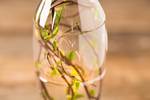Another Project to Make 100% Biobased PET Bottles
A second team pursues all-renewable beverage bottles based on plants.
Anellotech, Pearl River, N.Y., a sustainable technology company focused on producing cost-competitive renewable chemicals from nonfood biomass, announced last month the start of a new phase in its strategic partnership with Suntory Holdings Ltd. of Japan. Suntory owns leading consumer beverage brands such as Orangina and Schweppes, as well as major alcohol brands such as Jim Beam and Courvoisier. Their partnership began in 2012 with a collaboration agreement that has provided more than $15 million in funding to advance development and commercialization of all-biobased plastics for beverage bottles. Suntory, like Coca-Cola Co. and others, uses 30% plant-derived PET for its mineral-water brands.
The alliance with Suntory supports Anellotech’s development of bio-aromatics such as bio-paraxylene, the key component needed to make purified terephthalic acid (PTA) and dimethyl terephthalate (DMT), which account for the 70% of the PET molecule that is still based on petrochemicals. Anellotech’s proprietary thermo-catalytic biomass conversion technology (Bio-Cat) is said to produce cost-competitive “drop-in” green aromatics such as paraxylene and benzene. With construction now complete on its new development and testing facility, Anellotech expected groundbreaking for installation of a scale-up unit last month. The unit is to be operational later this year. Continuous operation of this unit will provide data supporting an eventual commercial-scale plant.
Anellotech and Suntory are not alone in pursuing the all-biobased PET beverage bottle. Last August in this column, we reported that Atlanta-based Coca-Cola Co. debuted a prototype of its first all-biobased PlantBottle (currently 30% biobased). Coca-Cola is working with Virent, Inc., Madison, Wis., a biofuels and biochemical company that can make bio-paraxylene from beet sugars. Virent is pursuing construction of a commercial-scale plant so that Coca-Cola can commercialize an all-biobased PET bottle by 2020.
Related Content
-
At NPE2024, Follow These Megatrends in Materials and Additives
Offerings range from recycled, biobased, biodegradable and monomaterial structures that enhance recyclability to additives that are more efficient, sustainable and safer to use.
-
How to Optimize Injection Molding of PHA and PHA/PLA Blends
Here are processing guidelines aimed at both getting the PHA resin into the process without degrading it, and reducing residence time at melt temperatures.
-
Honda Now Exploring UBQ’s Biobased Material Made from Unsorted Household Waste
UBQ is aiming to expand its reach for more sustainable automotive parts as well as non-automotive applications.












